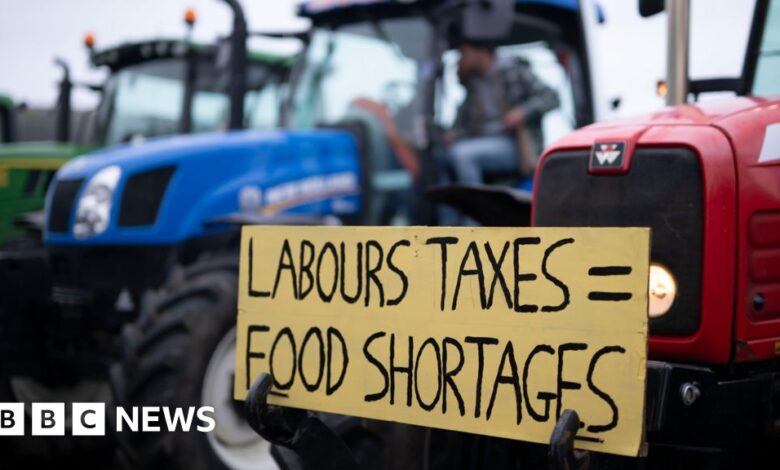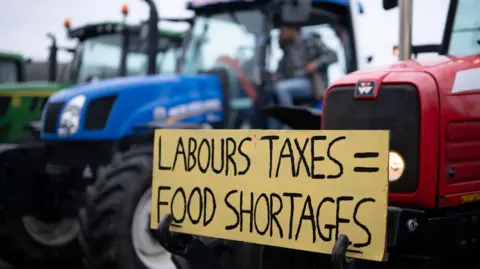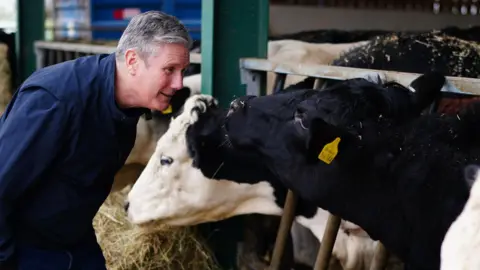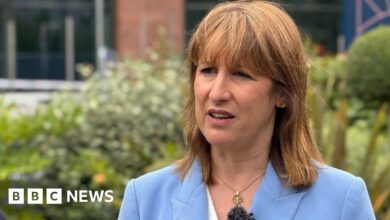Will Labour’s inheritance tax on farms come home to roost?

 Getty Images
Getty ImagesThe government is preparing to face the biggest protest yet over its domestic policy agenda since Labour won the general election.
It is the week where farmers are heading for Westminster – and bringing some noisy and influential friends with them.
Among those expected on Tuesday is the country’s most well known but relatively new-ish farmer, Jeremy Clarkson.
Guesswork about how many people will turn up at a protest before it has happened is exactly that, guesswork, but some reckon it could be between 10,000 and 40,000 people.
Nearly three weeks on from the Budget, when the plan to charge some farms inheritance tax was first announced, the anger seems to be growing, rather than easing.
There is a huge row about precisely how many people might be affected.
BBC Verify had a go here at working its way through the numbers.
But beneath that is a simmering anger about ministers’ perceived ignorance about the countryside – and a sense from many farmers of being persistently let down, by this government and its predecessors.
Indeed, speaking on The Westminster Hour on BBC Radio 4, Baroness Mallalieu, a Labour peer and the president of the Countryside Alliance, said the government’s changes to inheritance tax relief “smell of incompetence” and that a “large part of our party has become urban… divorced from a big section of the community”.
Two things strike me about all this: firstly, the absolute insistence from ministers from Sir Keir Starmer down that they are not going to change their minds.
And secondly, the beginnings of a parallel, perhaps, with the rows Labour had with many in rural Britain the last time it was in power.
Twenty-two years ago, around 400,000 people from across the country marched through central London to highlight the needs of rural communities.
The initial source of anger then was the ban on fox hunting.
Could this inheritance tax change prove equally totemic?
As farmers head for Westminster, the prime minister has been heading for South America – he is at the G20 Summit of the world’s biggest economies in Brazil for the next few days.
But the issue followed him into the skies of the south Atlantic, where he said he was “absolutely confident” that the “vast majority of farms and farmers” would not be affected by the changes.
“It’s important for us to keep communicating how that works” he said.
The truth is they have been trying to communicate how it would work ever since the Budget. I asked Sir Keir about it the day after – but the explanations have done little to dampen the anger.
 PA Media
PA MediaAsked whether he accepted that farmers felt betrayed over the changes, Sir Keir said “it’s very important that we support farmers.”
He then made an argument we can expect to hear the Environment Secretary Steve Reed and others make in the next few days, about the wider support the government insists it is offering farmers and the countryside.
“We’ve put £5bn in the Budget for the next two years into farming. That is not to be overlooked. That is the single biggest sum of money in a Budget over a two-year period that has ever been put down in relation to farming.
“On top of that, there’s £50m in relation to flooding, which is hugely important and £200m in relation to the outbreak of disease and infection which can be absolutely devastating.”
Bunkum say people in agriculture, suggesting this a creative spinning of the numbers and the money around now is comparable with when the UK left the European Union.
Incidentally, one government source even pointed to the planned changes to bus services in England as an example of how their ideas can help people in rural areas.
It shows their desire to attempt to mend fences with a swathe of the country some privately fear could turn against them if they don’t handle this well.
So why has this row become so noisy so quickly?
From the conversations I have had, I think there are three main reasons.
Firstly, inheritance tax, perhaps like no other tax, has an outsized emotive tug on so, so many people – in fact a far greater number of people than are ever likely to end up paying it.
The House of Commons Library, citing opinion polling, has described it as “the most unpopular tax in the UK”, even though just 3.7% of deaths led to an inheritance tax bill in 2020-21.
Some argue it is unfair as it represents double taxation; being taxed on money that has already been taxed.
For others, their opposition is much more deeply seated, a sense that it seeks to dilute the most human of all human emotions, to provide for your children when you are gone.
Secondly, throw into the mix a political rule first invented by The Economist magazine: “Never pick a fight with a profession that appears in a children’s book.”
Trades that are universally understood, at least in broad brush terms, and provide for our most essential needs can be very effective lobby groups, the argument goes.
Think doctors and nurses, but also farmers and food.
Thirdly, I am told it is worth seeing this row about inheritance tax in a wider context.
“It is the straw that has broken the camel’s back,” is how one farming source put it to me.
There was the new trade deal with Australia, which many farmers think undermines them.
There are the adjustments to farm subsidies being made after Brexit.
And there has been the seemingly never-ending chopping and changing of farming ministers as various prime ministers have come and gone. There have been five farming ministers in the last five years.
Put them all together and there is a disillusion and a widespread sense among farmers of not being listened to.
Westminster is certain to hear them this week.





